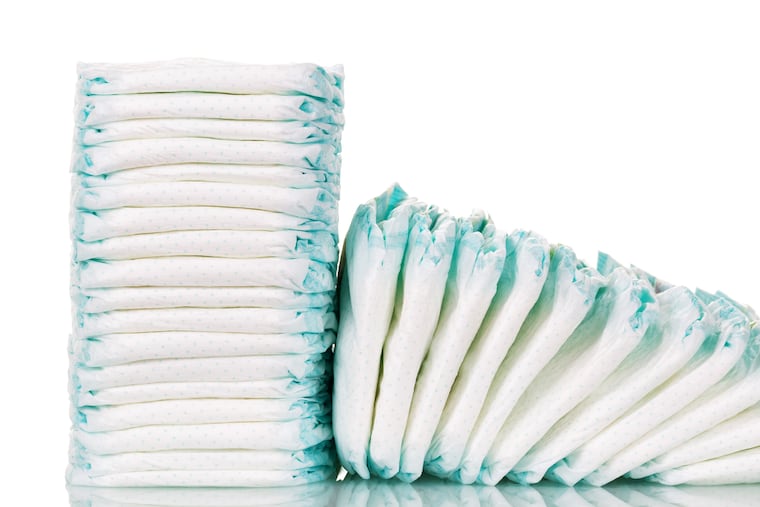An unlikely weapon in battling poverty: Diapers
While Americans are aware that people in poverty need food, many don't realize the problems caused by a lack of diapers.

For Brenda Hernandez, keeping her 5-month-old son, Kenneth, in diapers has been a scramble.
“Lots of moms who don’t have the means are struggling to get diapers,” said Hernandez, 34, who is separated from her husband and lives in Hunting Park. “They’ll wait to change the diaper until it’s saturated to conserve, and it leads to infections."
Kenneth is one of the lucky ones, dry-bottomed and rash-free. That’s because Hernandez, who has worked as a home health-care aide and a dental assistant, among other jobs, gets donated diapers from Casa del Carmen, an agency that’s part of Catholic Social Services of the Archdiocese of Philadelphia.
“That generosity helps sustain my child and other children,” Hernandez said. “I don’t have to debate myself over whether I’ll pay only half the electric bill because I need diapers.”
While Americans are aware that people in poverty must apply for food stamps, stand in line at food pantries, and generally fight and fret to stay clothed, housed, and insured, many don’t realize how big a problem the lack of diapers poses.
19 diapers short
One in three U.S. families experience diaper need, according to the National Diaper Bank Network in New Haven, Conn., which supplies diapers to agencies throughout the nation. It reported that the average household in need falls 19 diapers short each month.
Infants go through 10 to 12 diapers each a day, while toddlers need six to eight, the network figures. That costs $70 to $80 per family per month, according to the network, which added that diapers can consume 6 percent of the salary of a parent working full time and making minimum wage.
“Diaper need is a window into poverty in America,” said Joanne Goldblum, Network CEO. Anyone who’s struggling to survive, Goldblum said, is having a hard time getting enough diapers.
Goldblum said that her organization, which has distributed more than 220 million diapers donated by diaper manufacturers as well as by individuals to 200 diaper-bank programs throughout America since 2011, isn’t getting to everyone in need.
“We may meet the need of just 25 percent of those who need diapers,” she said.
Waiting lists
In Philadelphia, as throughout America, there are long waiting lists of parents awaiting donated diapers, said Pat Kennedy, founder and president of the Greater Philadelphia Diaper Bank in Kensington. She said her organization distributed 734,000 diapers last year.
“And the need is increasing,” she said, adding that undocumented immigrants require diapers but are loath to apply for them, fearing deportation.
The diaper bank, along with Mitzvah Circle Foundation in Harleysville, Montgomery County, and Cradles to Crayons, in Nicetown, are part of the National Diaper Bank Network, Kennedy said.
Children whose parents don’t have enough diapers will often keep kids in wet and soiled disposable diapers for a long time — possibly even rinsing then reusing them, Goldblum said. Along with the rashes and urinary-tract infections that kids suffer, there are other consequences.
Uncomfortable children will fuss, and that, in turn, can incite child abuse from demoralized parents, Goldblum said. A Yale University School of Medicine study in 2017 found that low-income mothers with diaper need have been known to develop depression.
“Parents become frustrated and exasperated,” said Hernandez, the mom from Hunting Park. "They have a tendency to take it out on the child himself, as if it’s his fault he’s in that predicament.
“The diaper is a stress relief for the mom.”
No diapers, no child care
Most child-care centers require parents to lay in a supply of disposable diapers for their kids. If parents can’t afford diapers, they can’t drop off their children, which can affect whether parents can work or go to school, experts have said.
Unlike food and housing, there isn’t a safety-net program for purchasing diapers, said Kathleen Bevenour, assistant director of community-based services for Catholic Social Services. “People are just stretched,” she said.
Congress is trying to address diaper need, with Sen. Bob Casey (D., Pa.) cosponsoring a bill to help families. He’s a “huge supporter," Goldblum said, although the bill, as well as a similar one in the House of Representatives, has not progressed.
Some say low-income people should switch to cloth diapers, used in an estimated 10 percent of U.S. homes, according to experts.
But such diapers must be cleaned, and many people who live in poverty don’t have washing machines. Making things even harder, public laundries frequently prohibit customers from cleaning diapers, Goldblum added.
“People criticize poor women for not using cloth,” she said. "But you’d be asking women to bring dirty diapers, plus their kids, onto buses as they travel to laundries that may not even allow diapers.
"We seem to expect so much more of poor women than we do of middle- and upper-class women.
“It’s not fair.”
Philadelphia Media Network is one of 21 news organizations producing Broke in Philly, a collaborative reporting project on solutions to poverty and the city’s push toward economic justice. See all of our reporting at brokeinphilly.org.